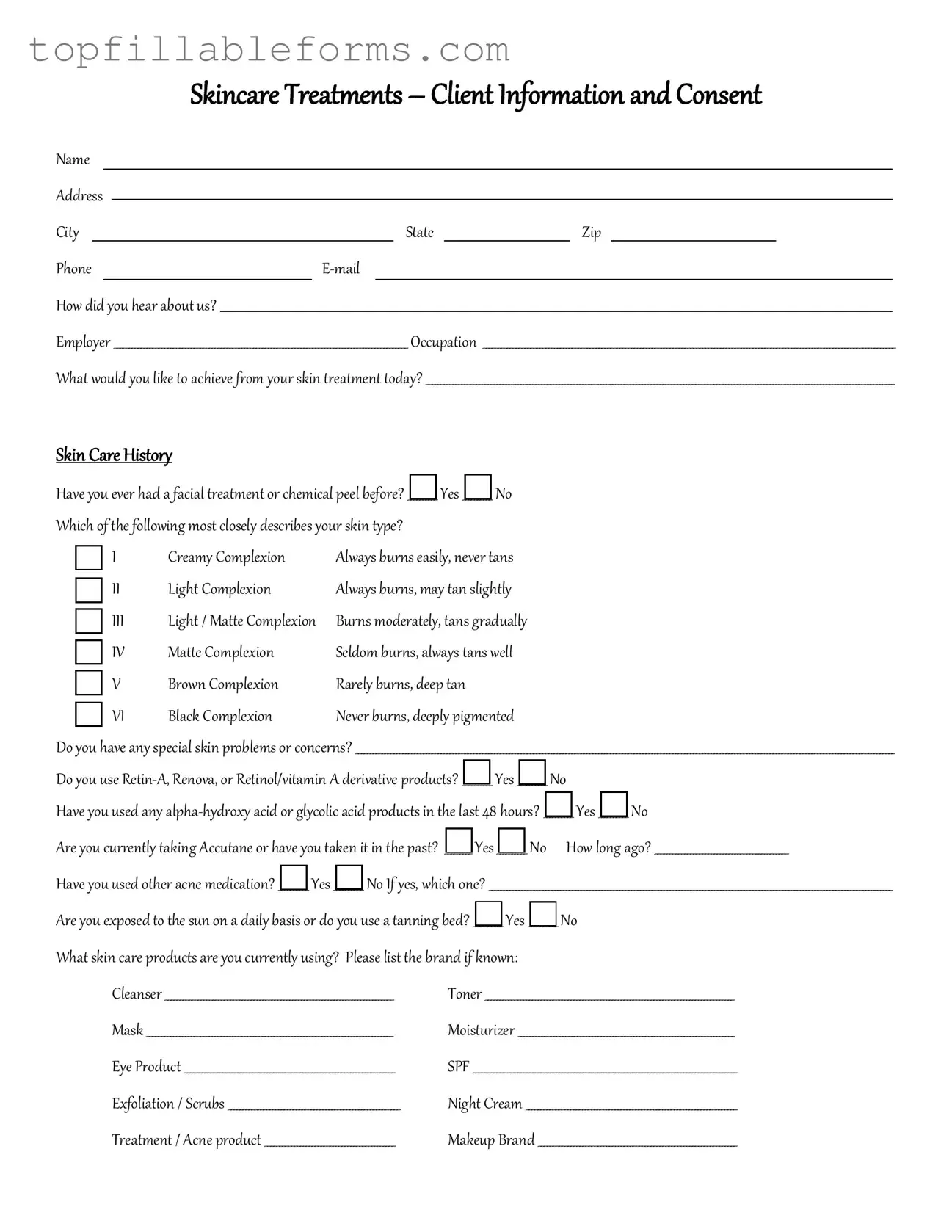Skincare Treatments – Client Information and Consent
Name
Address
|
|
|
|
|
|
|
|
|
|
|
|
|
City |
|
|
|
|
State |
|
|
Zip |
|
|
Phone |
|
|
E-mail |
|
|
|
|
|
|
How did you hear about us? |
|
|
|
|
|
|
|
|
|
|
Employer ___________________________________________________________________________________________________ Occupation |
___________________________________________________________________________________________________________________________________________ |
What would you like to achieve from your skin treatment today? ______________________________________________________________________________________________________________________________________________________________
Skin Care History
Have you ever had a facial treatment or chemical peel before? __________ Yes __________ No
Which of the following most closely describes your skin type?
I |
Creamy Complexion |
Always burns easily, never tans |
II |
Light Complexion |
Always burns, may tan slightly |
III |
Light / Matte Complexion |
Burns moderately, tans gradually |
IV |
Matte Complexion |
Seldom burns, always tans well |
V |
Brown Complexion |
Rarely burns, deep tan |
VI |
Black Complexion |
Never burns, deeply pigmented |
Do you have any special skin problems or concerns? ______________________________________________________________________________________________________________________________________________________________________________________
Do you use Retin-A, Renova, or Retinol/vitamin A derivative products? __________ Yes __________ No
Have you used any alpha-hydroxy acid or glycolic acid products in the last 48 hours? __________ Yes __________ No
Are you currently taking Accutane or have you taken it in the past? _________ Yes __________ No How long ago? _____________________________________________
Have you used other acne medication? __________ Yes __________ No If yes, which one? ________________________________________________________________________________________________________________________________________
Are you exposed to the sun on a daily basis or do you use a tanning bed? __________ Yes __________ No
What skin care products are you currently using? Please list the brand if known:
Cleanser _____________________________________________________________________________ |
Toner ____________________________________________________________________________________ |
Mask ___________________________________________________________________________________ |
Moisturizer _________________________________________________________________________ |
Eye Product _______________________________________________________________________ |
SPF _________________________________________________________________________________________ |
Exfoliation / Scrubs __________________________________________________________ |
Night Cream _______________________________________________________________________ |
Treatment / Acne product ____________________________________________ |
Makeup Brand ___________________________________________________________________ |

Please circle any areas of concern you have regarding your skin: |
|
|
Breakouts / Acne |
Blackheads / Whiteheads |
Excessive Oil / Shine |
|
Rosacea |
Broken Capillaries |
Redness / Ruddiness |
|
Sun spot / Brown spots |
Uneven Skin Tone |
Sun Damage |
|
Wrinkles / Fine Lines |
Dull / Dry Skin |
Flaky Skin |
|
Dehydrated Skin |
Sensitive Skin |
|
Eyes: |
Dark Circles |
Puffiness |
Fine lines |
Please circle if you have ever had an allergic reaction to any of the following: |
|
|
Cosmetics |
Medicine |
Food |
|
Animals |
Sunscreens |
Pollen |
|
AHAs |
Fragrance |
Shellfish |
|
Latex |
Collagen |
Other: ___________________________________________________________________________________________________ |
Have you ever had Botox, Restylane, or other injections? ______________________________________________________________________________________________________________________________________________________________________________
Ladies only:
Are you taking hormonal contraceptives? __________ Yes __________ No
Are you pregnant or trying to become pregnant? __________ Yes __________ No Are you nursing? __________ Yes __________ No
Experiencing any menopause problems? ____________________________________________________________________________________________________________________________________________________________________________________________________________
Are you undergoing any hormone replacement therapy or cancer treatments? ____________________________________________________________________________________________________________________________________
I understand this consent form and have answered each question truthfully. I understand that withholding information from my skin care therapist may result in contraindications or skin irritation from treatments received. The skin care treatments I receive at Belle Waxing and Skincare are voluntary and I release Belle Waxing and Skincare from liability and assume full responsibility thereof.



